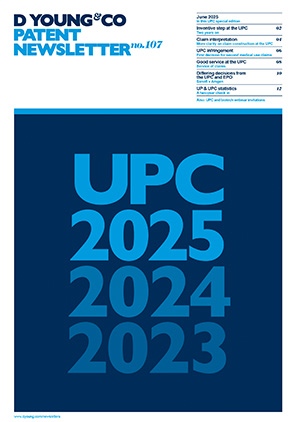Agritech: farm use exemptions to patent infringement in the UK
If a patent is valid and in force in the UK, one can infringe a product that it protects it if one is making it, importing it, offering or putting it on the market, using it, or keeping it for any of these purposes. Similarly one can infringe a process by using or offering it for use in the UK where it is known or would be obvious that it infringes. Meanwhile any direct products of such a patented process are subject to similar restrictions as patented products.
In addition there is the notion of secondary or “contributory” infringement, which involves supplying or offering specific means essential to the invention when it is known or obvious that the means are suitable for this and are intended for putting the invention into effect in the UK.
Whilst there are various and sometimes important subtleties that affect the applicability of these basic principles, there are also some exemptions from infringement included in the statute itself.
The ones perhaps most relevant to agritech are in section 60(5) of the UK patents act: ”S60(5)(b). An infringement is exempt if done for experimental purposes relating to the subject matter of the invention.”
What constitutes an experiment per se may be thought of as an activity seeking to produce genuinely new information. In this case, experiments can have an ultimately commercial purpose in terms of improving a business, hence testing a patented process to see it if works for a particular combination of soil condition and crop for example may be allowable. Similarly, experiments using a patented process as a control for evaluating alternatives under development may also be allowable.
However, such a comparative experiment would not be allowed if its primary purpose was to demonstrate the superiority of such an alternative to a third party, as this is in effect marketing rather than legitimate experimentation. Similarly experiments used to test a market, or which have the immediate purpose of generating revenue, are not considered true experiments for the purposes of this exclusion. Hence experiments with a scientific or technical goal are generally acceptable, whereas those with a marketing or sales goal are not.
Meanwhile although the person doing the experiment may be exempted from the infringement, it is still technically an infringement and so a contributory second party supplying the product or process may remain liable.
Therefore, negotiating this area can be complicated and it may be worth discussing with your patent representative before embarking on agricultural experiments or trials, or supplying these. If you are trialling your own invention, also consider the issues of disclosure (we will be discussing this subject in more detail in our August 2025 patent newsletter).
“S60(5)(g): Use by a farmer of the product of their harvest for propagation / multiplication on their own holding (assuming the original stock was bought or otherwise used with authorisation of the patentee).”
The ability to sell a harvest (for example, for consumption) is protected by “farmer’s privilege” (Schedule A2 section (10). The exemption above relates to re-using part of the harvest the following year as seed stock instead of buying new stock from the patentee.
The exemption is limited to the farmer’s own holding, which is the land they actually exploit for plant growing, whether owned by the farmer or not. The exemption applies to a list of crops (Schedule A1 section (2)): falling under the general categories of fodder plants, cereals, potatoes, and oil and fibre plants.
Notably the exemption acts like a compulsory license, as the farmer is obligated to pay the patentee a remuneration; albeit one that “must be sensibly lower” than the cost of new seed stock. As a result it is important when either selling (or buying) patented seed stock to agree a monitoring process and remuneration rate.
Finally the exemption only applies to patents, and not to any concurrent plant breeder’s rights, so these should be accounted for in any agreement where relevant.
“S60(5)(h): Use by a farmer of an animal or animal reproductive material for an agricultural purpose (assuming the original animal or reproductive material was bought or otherwise used with authorisation of the patentee).”
This is a corresponding provision for propagation in animals. Again whilst a farmer can sell the resulting animals for consumption and use them for breeding on their own holding, they cannot sell them for breeding purposes. In this case, there is no equivalent schedule of included animals, and no schedule laying out remuneration; consequently again a contractual arrangement for propagation use may be essential.
Accordingly, whether you are developing new strains of animal or plant, or evaluating or using these in the field, it can be worth checking the extent to which your products and processes are protected, and where exempted under the above provisions, how best to draft agreements to accommodate them.
If you have any questions, please ask your usual D Young & Co representative.
Useful links
Schedule A2 section (10): dycip.com/patents-act-schedule-a2-s10
Schedule A1 section (2): https://www.legislation.gov.uk/ukpga/1977/37/schedules

